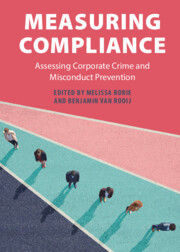Book contents
- Measuring Compliance
- Measuring Compliance
- Copyright page
- Contents
- Figures
- Tables
- Contributors
- 1 Measuring Compliance: The Challenges in Assessing and Understanding the Interaction between Law and Organizational Misconduct
- Part 1 The Compliance Industry, the State, and Measurement Needs
- Part 2 Quantitative Approaches to Measuring Corporate Compliance
- Part 3 Qualitative Approaches to Measuring Corporate Compliance
- Part 4 Mixed Methods and Building on Existing Compliance Research
- 14 Mixing and Combining Research Strategies and Methods to Understand Compliance
- 15 Using Meta-Analysis/Systematic Review to Examine Corporate Compliance
- 16 Data Simulations as a Means of Improving Compliance Measurement
- Index
- References
16 - Data Simulations as a Means of Improving Compliance Measurement
from Part 4 - Mixed Methods and Building on Existing Compliance Research
Published online by Cambridge University Press: 17 February 2022
- Measuring Compliance
- Measuring Compliance
- Copyright page
- Contents
- Figures
- Tables
- Contributors
- 1 Measuring Compliance: The Challenges in Assessing and Understanding the Interaction between Law and Organizational Misconduct
- Part 1 The Compliance Industry, the State, and Measurement Needs
- Part 2 Quantitative Approaches to Measuring Corporate Compliance
- Part 3 Qualitative Approaches to Measuring Corporate Compliance
- Part 4 Mixed Methods and Building on Existing Compliance Research
- 14 Mixing and Combining Research Strategies and Methods to Understand Compliance
- 15 Using Meta-Analysis/Systematic Review to Examine Corporate Compliance
- 16 Data Simulations as a Means of Improving Compliance Measurement
- Index
- References
Summary
Abstract: This chapter discusses how Monte Carlo Simulations (MCS) can be used to improve empirical studies of compliance. They are a form of stochastic simulation, which aim to imitate and represent real-world processes with the use of random variables. This chapter describes three applications of MCS using compliance-related examples, including (a) estimating total costs of noncompliance, (b) identifying the optimal sample size for a planned study, and (c) demonstrating potential bias in model estimates. Ultimately, MCS can assist the field of compliance in navigating certain problems faced by many research domains, such as replication problems.
- Type
- Chapter
- Information
- Measuring ComplianceAssessing Corporate Crime and Misconduct Prevention, pp. 285 - 301Publisher: Cambridge University PressPrint publication year: 2022



